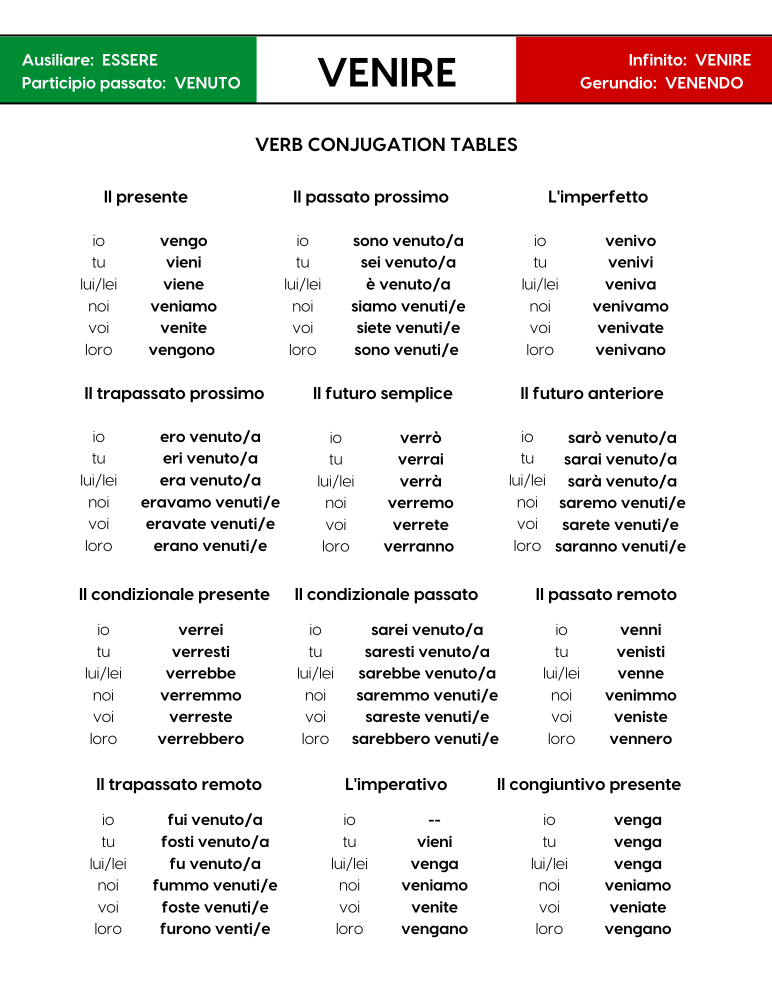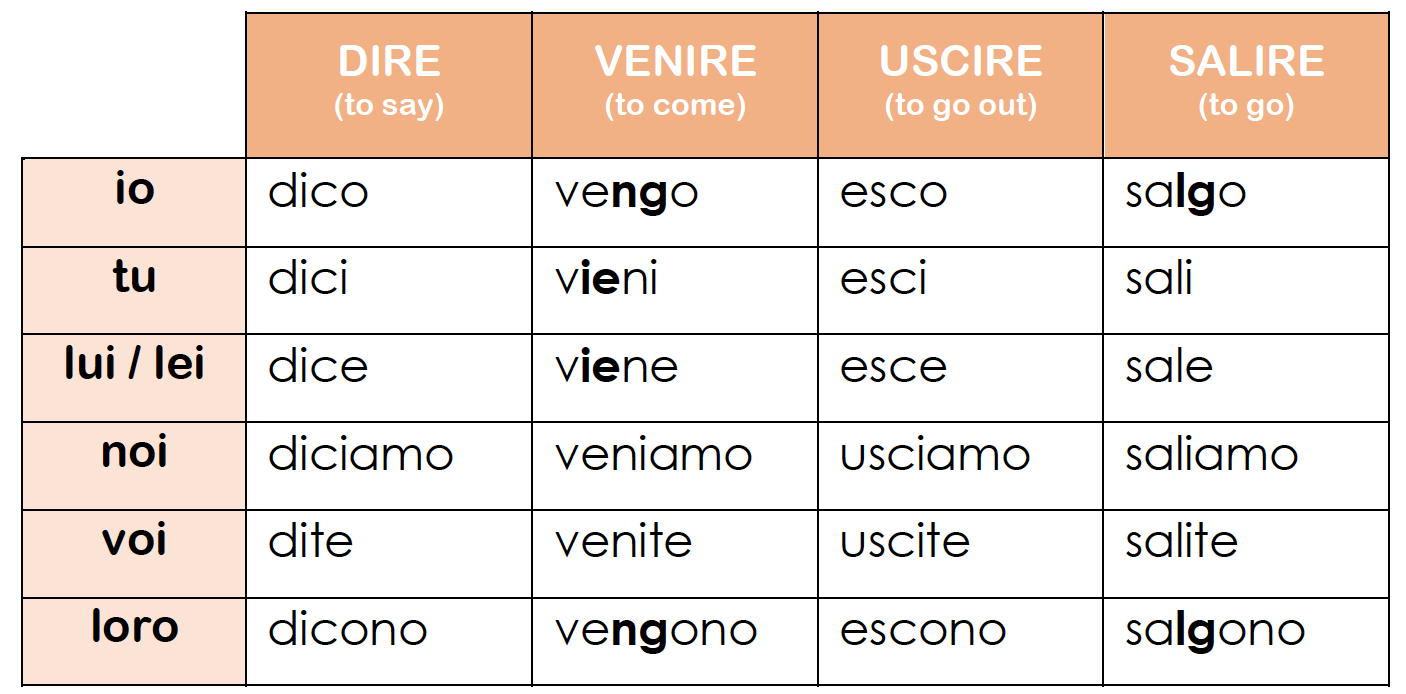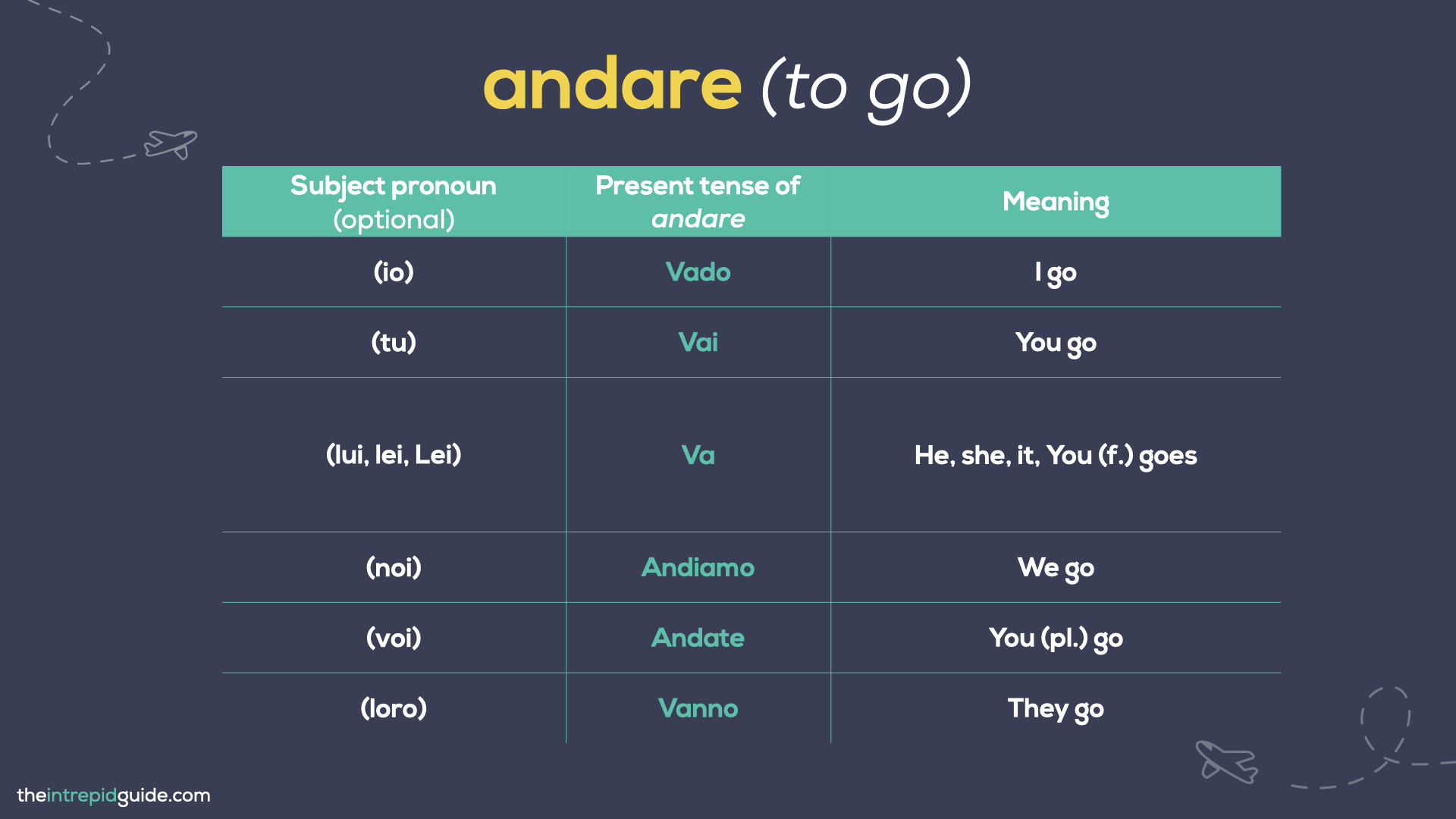
VENIRE ITALIAN IRREGULAR VERB YouTube
venire Gerundio venendo Participio Passato venuto Model : venire Auxiliary : essere Other forms: venirsi / non venire Advertising Indicativo Presente io vengo tu vieni lei/lui viene noi veniamo voi venite loro vengono Imperfetto io venivo tu venivi lei/lui veniva noi venivamo voi venivate loro venivano Passato remoto io venni tu venisti

The Italian Verb Files Venire The Happy Maple Language Co
Ho paura! - Can you come to the doctor with me? I'm scared. Vengo a casa tua alle 18 e andiamo al ristorante! - I will come to your house at 6 and we will go to the restaurant! Be careful when you are using prepositions, especially when you are talking about places. You will use preposition IN instead of A when you are talking about : 1.

(1939) Vince's Market 3250 Silver Lake Blvd, Los Angeles, CA 90039.Started as a small Italian market with deli case Vince's originally shared their space with a barber & beauty shop. Opened in 1939 by Joseph and Mabel Caravella and named for their son Vince, the family expanded the business in 1946, taking over the whole building and enlarging their menu.

More on Italian irregular verbs in present tense — Cuore italiano
Venire is an Italian irregular verb meaning to come. Venire appears on the 100 Most Used Italian Verbs Poster as the 11st most used irregular verb. Venire Conjugation: Present Tense *Irregular forms in bold. Venire Passato Prossimo The passato prossimo of Venire is formed by combining the auxiliary verb essere with the past participle venuto.

learn Italian Verb 'venire' Present Tense Conjugation YouTube
VENIRE means "to come" in English. But, as with many Italian verbs, it can be used in a variety of different ways. VENIRE is irregular in many tenses such as the present, the future, its past participle (venuto), etc. So when you are conjugating it, double check if you are unsure. VENIRE - Italian Verb Conjugation Table Click to download for FREE!

How to Conjugate the Verb "Venire" in Italian Italian language
Venire is an irregular verb of the third conjugation that translates most simply to the English "to come," but whose uses in Italian include amounting to, turning out, descending from, manifesting or occurring, hailing from, and arising or coming to.

The presente tense of verb "VENIRE" (to come) learnitalian
After ANDARE, here's another irregular verb you can't do without: VENIRE - to come. Learn how to conjugate it in the most common tenses and listen to idioms.

All You Need to Know About the “Venire” Conjugation in Italian Italian
Venire is an irregular verb and is the equivalent of the English "to come". It means to come from, to arrive, to occur, and is sometimes used in a welcoming tone too (e.g. Vieni! - Come on in!) Venire is an intransitive verb - therefore it lacks a direct object, and its compound tenses are conjugated with the auxiliary essere.
:max_bytes(150000):strip_icc()/TuscanyFriends-58bef5f45f9b58af5c8fa0b1.jpg)
How to Conjugate the Verb "Venire" in Italian
How to conjugate Italian verb 'venire'. Venire is an irregular, third conjugation verb that means to come, to arrive. Non dimenticarti di venire a trovarmi ( Don't forget to come and visit me) Di solito veniamo in questo posto ogni sera ( Usually, we come to this place every night) Il papa dice che arriverà domani ( Dad says is arriving.

venire to come venire italian parliamoitaliano
Venire Definition: To come, arrive Venire Can Also Mean Originate/come from Comes out/turns out Occur/happen Note: Venire is an irregular -ire verb, so you'll need to memorize the conjugation on your own. Italian Venire Conjugation Venire Presente Conjugation: Venire Presente Examples Chi viene con me? = Who is coming with me?

ANDARE and VENIRE What is the Difference? (Includes FREE Quiz) The
'venire' conjugation table in Italian Go to the definition page of venire Indicative Subjunctive Imperative Infinitive venire Past Participle venuto Gerund venendo Indicative Present io vengo tu vieni lui/lei/Lei viene noi veniamo voi venite loro vengono Imperfect io venivo tu venivi lui/lei/Lei veniva noi venivamo voi venivate loro venivano Future

Conjugation Venire 🔸 Italian verb in passato prossimo, imperfetto
Italian: venire Italian verb 'venire' conjugated Cite this page | Conjugate another Italian verb Nominal Forms Infinito: venire Participio presente: venente Gerundio: venendo Participio passato: venuto Nominal Forms Infinito: essere venuto Participio presente: essente venuto Gerundio: essendo venuto Indicativo Presente Passato prossimo Imperfetto

learn Italian Verb venire Test Your Knowledge with quiz YouTube
Venire is one of the most common and useful Italian verbs. It usually means "to come": Per esempio… Venire can also mean "to happen" or "occur." Venire present tense conjugations Venire is an irregular - ire verb: Related lessons Antonym: andare (to go) Subject pronouns Top 11 irregular verbs En español Venir En français Venir

The Italian Verb Files Venire The Happy Maple Language Co
Italian Verbs Conjugation Type the verb you wish to conjugate (ie: mangiare, dormire, amare) venire Indicativo Presente io vengo tu vieni lui viene noi veniamo voi venite loro vengono Passato Prossimo io sono venuto tu sei venuto lui è venuto noi siamo venuti voi siete venuti loro sono venuti Imperfetto io venivo tu venivi lui veniva noi venivamo

Italian Verb "VENIRE" (10 of its most common USES Present Tense
Venire is an irregular verb of the third conjugation. Being a verb of movement, we generally apply it in the meaning of heading to, hailing from, descending from, occurring and arising. Venire principally translates the English verb to come. Examples: Vieni o no? Il treno sta per partire. Are you coming or not? The train is about to leave.

VENIRE Conjugation Italian Italian Verb COME YouTube
In Italian, interestingly, we can also use the verb venire (to come) instead of essere to form a passive sentence in the imperfect, present, or future tense. We use the verb venire to make the sentence slightly more formal, for example in the case of rules, procedures, or court orders.